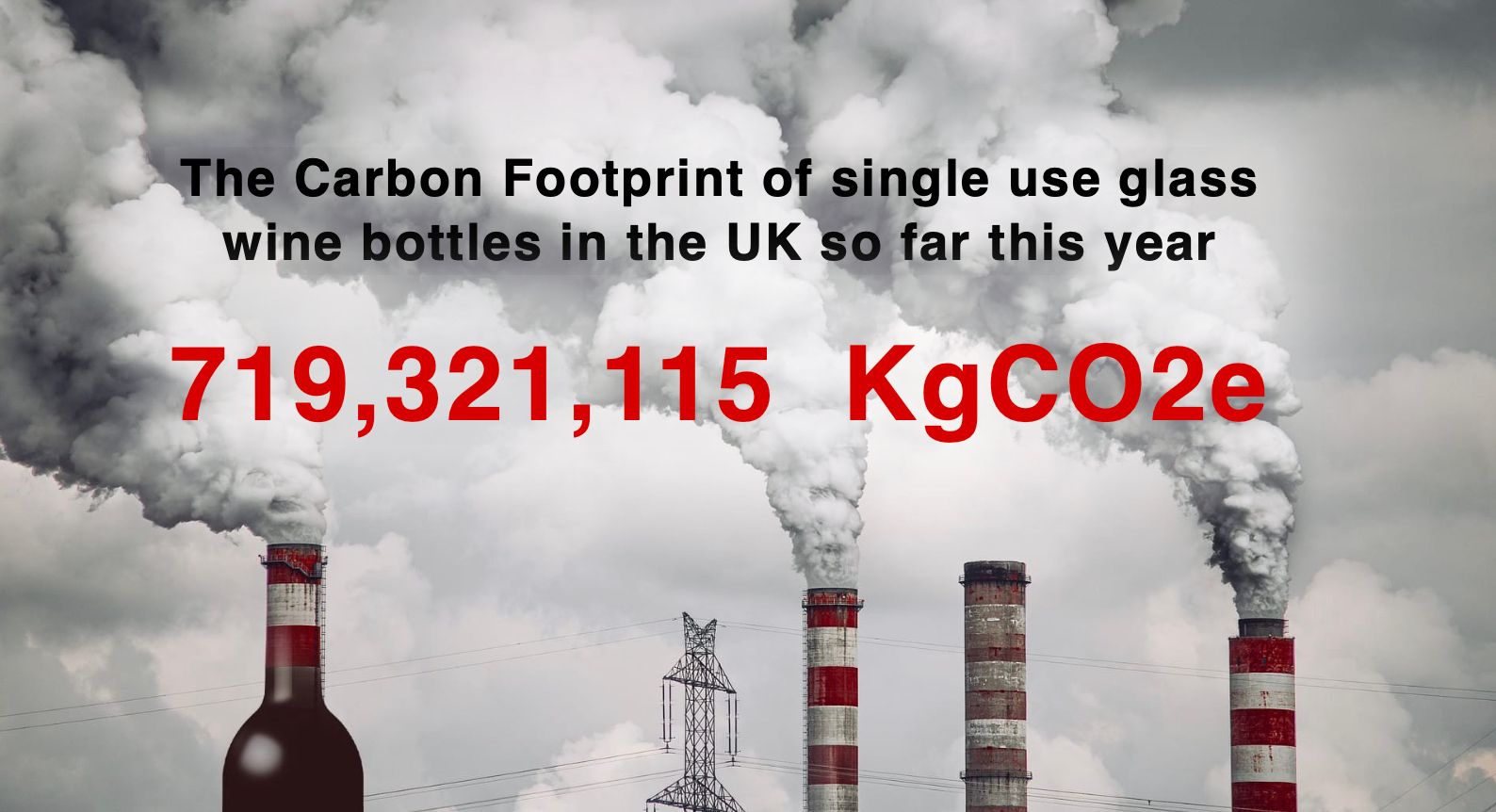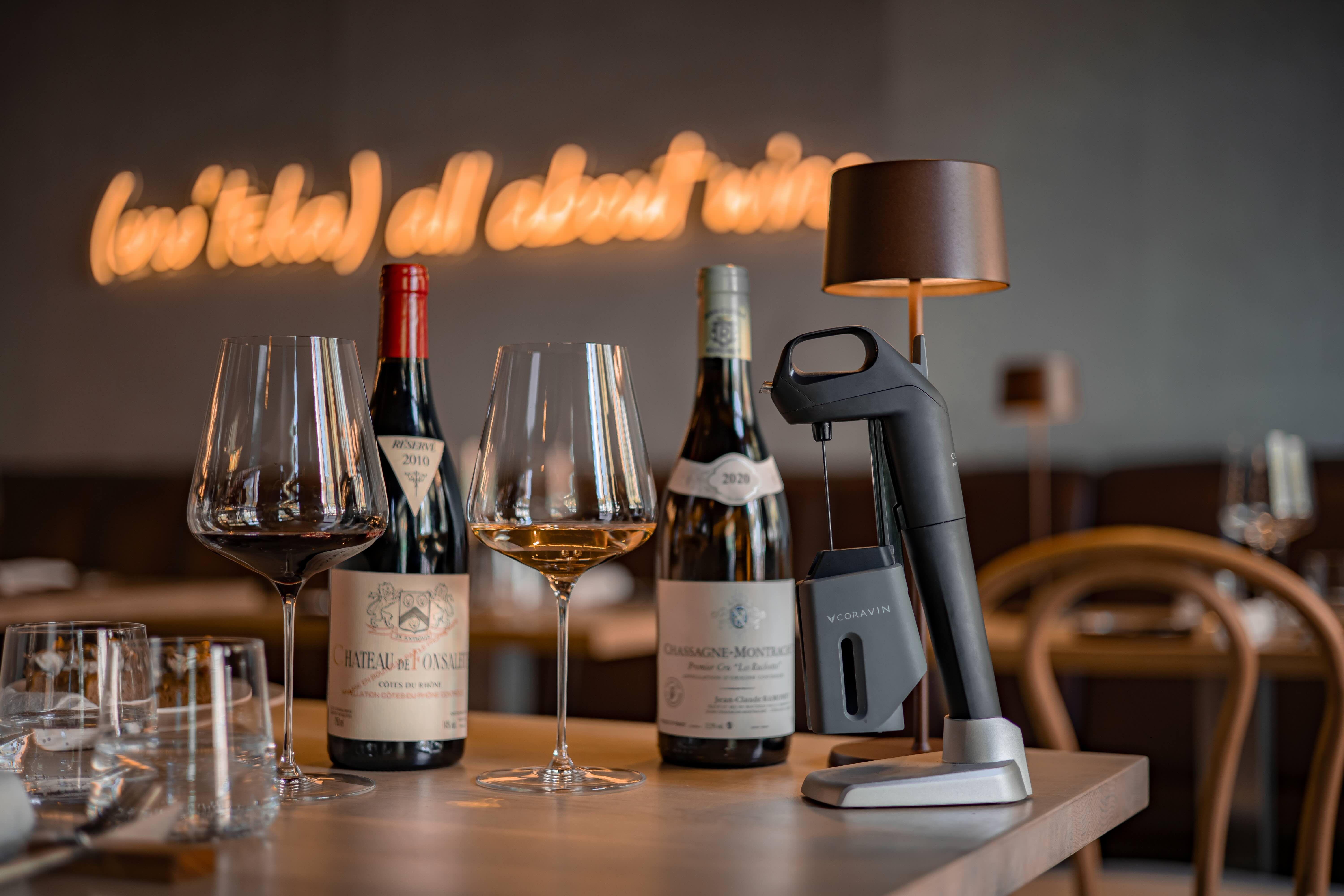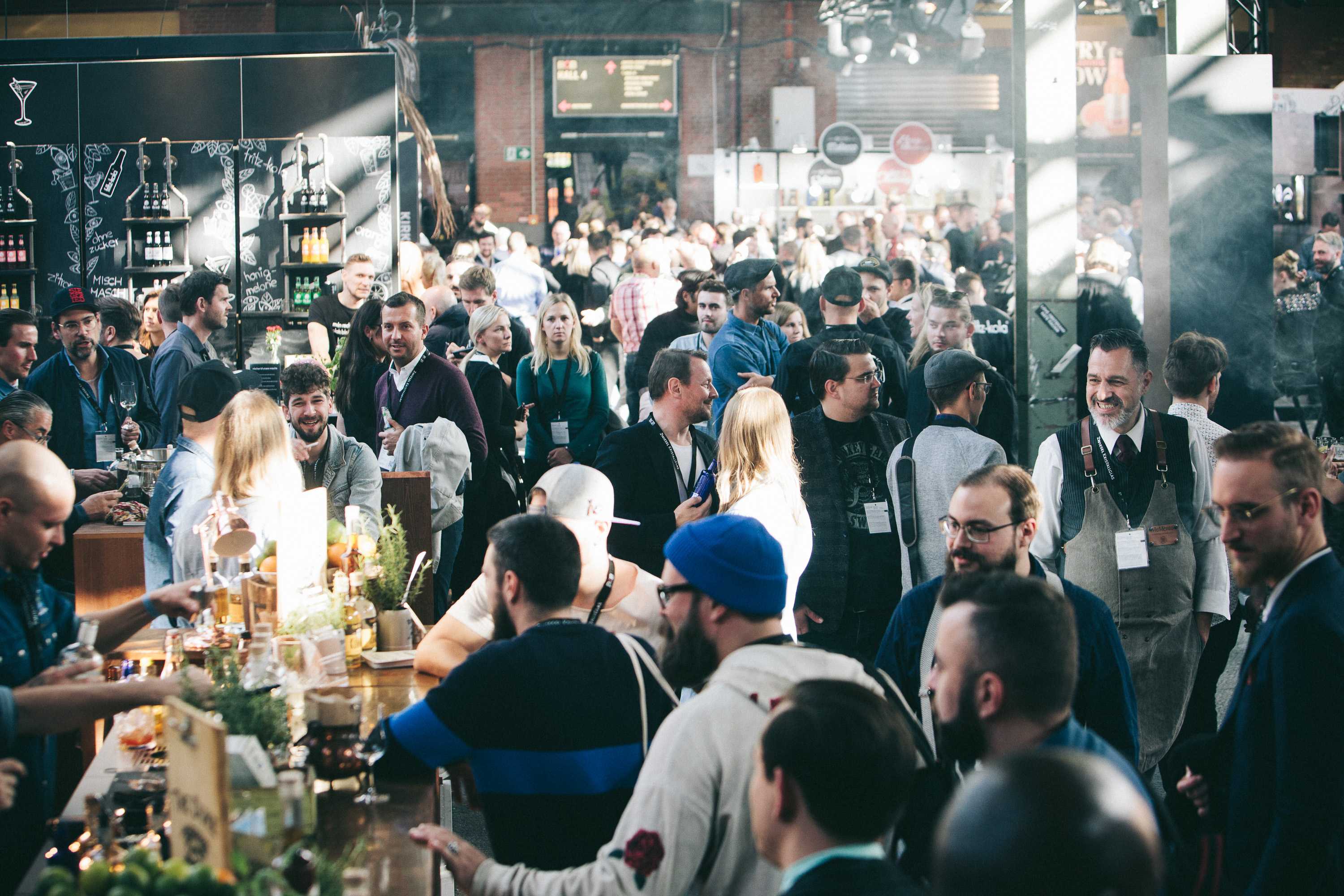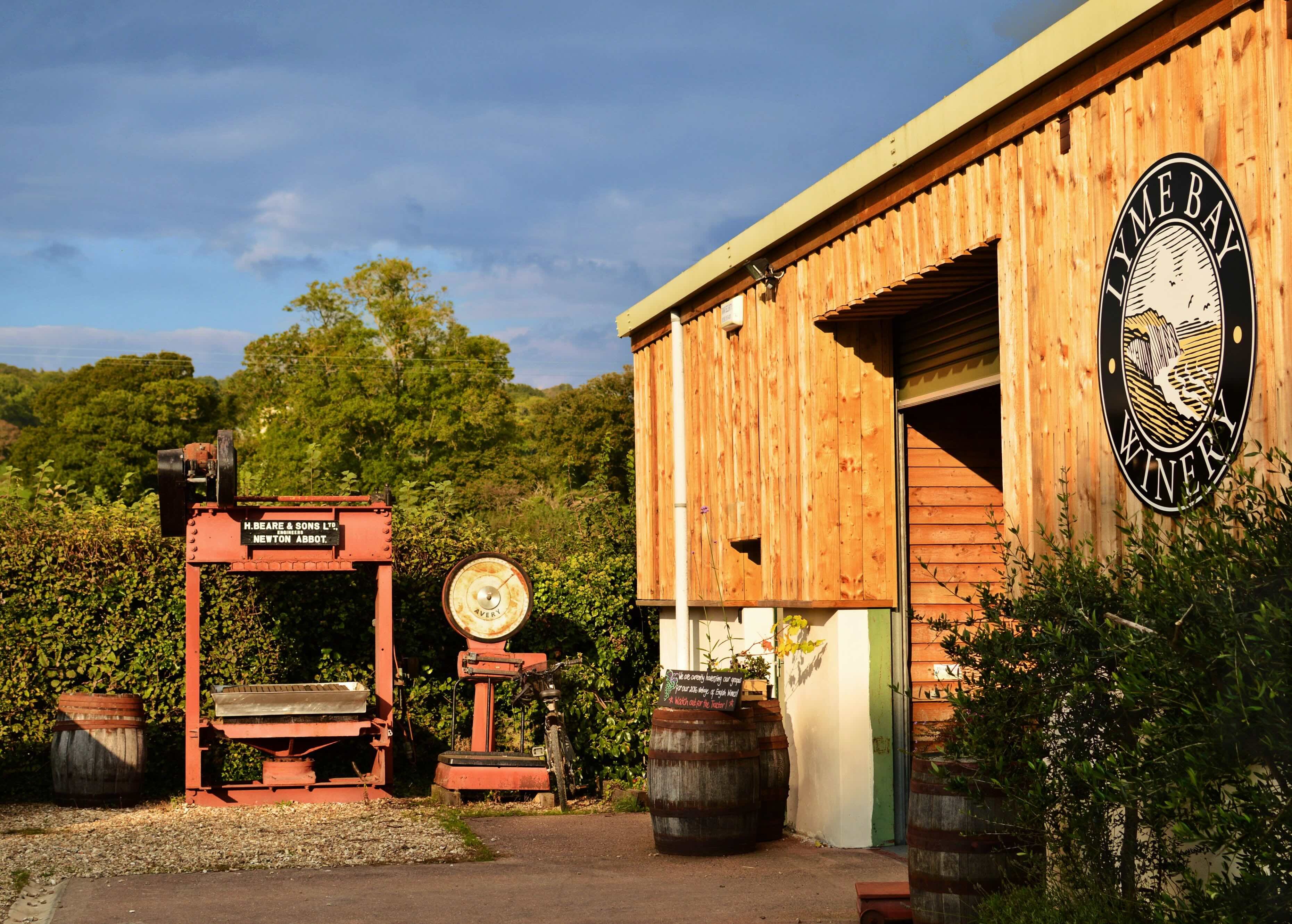Oliver Lea, co-founder of the BIB Wine Company that specialises in premium boxed wine, explains why he and fellow alternative wine format companies have formed the WTAF to campaign for the government to take action against glass in favour of more sustainable packaging solutions.
Can you tell us about WTAF and how it came about?
It was pretty casual at first – there were a handful of boxed and canned wine companies that kept bumping into each other at tastings. We were all passionate about the massive carbon footprint savings associated with our products, but pretty frustrated that consumers didn’t seem to know about them.
Pretty much everyone in the wine industry that we spoke to seemed to agree that the biggest issue in wine sustainability was the manufacturing and recycling of glass, but at the same time it seemed like something of an open secret in wine.

The WTAF are united in wanting the government to take action on glass bottles and help promote alternative packaging formats
Most dedicated alternative format wine companies are small start ups, so we decided that if we wanted to be heard, we needed to collaborate. After our first event, a tasting at the Institute of Masters of Wine, there was some amazing press and subsequently a lot of interest from other alternative format companies, so we grew from there. The acronym is not an accident by the way. We wanted to create a reaction, and its alternative meaning echoes our frustration when we started up.
What are your key messages and objectives?
It’s all about making wine more sustainable by reducing the greenhouse gas emissions of the wine we drink. Reducing our reliance on traditional glass bottles is by far the biggest step we can make to achieve this. However, for cans, kegs, boxes etc to be accepted, we need people to know that there’s no sacrifice in the quality of wine. That’s why we started with a tasting in November 2021 at the Institute of Masters of Wine, and it’s also why WTAF is really also about quality.
How are you going about trying to achieve them?
We’ve started simply by growing our membership and showcasing exciting wines in different sustainable formats. All these formats come with different benefits, and we think it would be unwise for the industry to try and find a single ‘solution’. So we try to present a range of options that customers can choose from. We’ve got returnable glass bottles, kegs, pouches, paper bottles and of course the cans and boxes we started with, all working together.
As well as showcasing what’s on offer, it’s also about frank discussions within the industry and getting a clear and simple message across to people outside of it.
The starting point is for those of us working in wine to admit that our carbon footprint is, in fact, a big deal. In the UK alone, we could save up to 750,000,000 KgCO2e of greenhouse gas emissions every year by switching from traditional bottles to alternative formats. That’s the equivalent of more than 1 million people flying to New York and back every year, or taking 350,000 cars off the road. It would be more than the equivalent carbon footprint of all of the residential energy supply in Manchester.
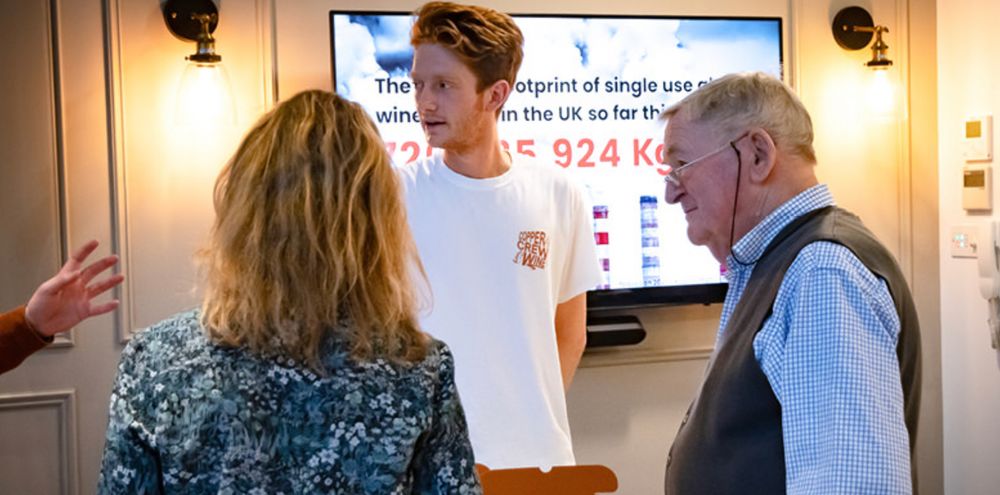
Hugh Johnson OBE at the WTAF tasting last November with the Copper Crew’s Oli Purnell
The UK has made the highest per capita contribution to climate change of all countries, but the effects are felt here less than in many developing countries. Wine epitomises the lifestyle of developed nations like the UK, and to get sucked into thinking that the GHG savings can come from other industries is incredibly irresponsible and selfish.
We have to start by looking at ourselves. Kicking off this discussion has been brilliant, and we’ve actually found people in wine to be receptive and keen to see what they can do. There are always going to be some complexities, but realising we need to do something as an industry and in a hurry, allows us to get a much clearer message out to wine drinkers at home.
What sort of trade support do you have in terms of members?
We’re still a small organisation, but we represent some really exciting wine companies. There are 13 of us at present, but we represent the very best available in alternative formats. We’ll definitely be growing further – we’ve spoken with a number of established wine companies looking to increase their offering in these formats, and we’re not exclusive at all. The support from outside of this group of members and potential members is amazing too. It really feels like there’s a coming together of the industry around this issue. Something has definitely changed since we started.
How do you become a member – what criteria you use?
It’s really simple. You have to have wine in a sustainable alternative format – one that significantly reduces greenhouse gas emissions over traditional bottles. You have to be willing to chip in and collaborate. And your wine has to fit our quality criteria. This last point is really important – if we’re to convince people to move across to new formats, we need quality to be a motivating factor as well as sustainability.
Are you looking to get international support and for the trade to take action around the world?
At the moment our main sphere of influence is centred around the UK. That said, we’d love to create a global network, and have groups of companies running events and tastings around the world.
You have just had this week an open letter published in The Times and a follow up news story – what did it say and how did that come about?
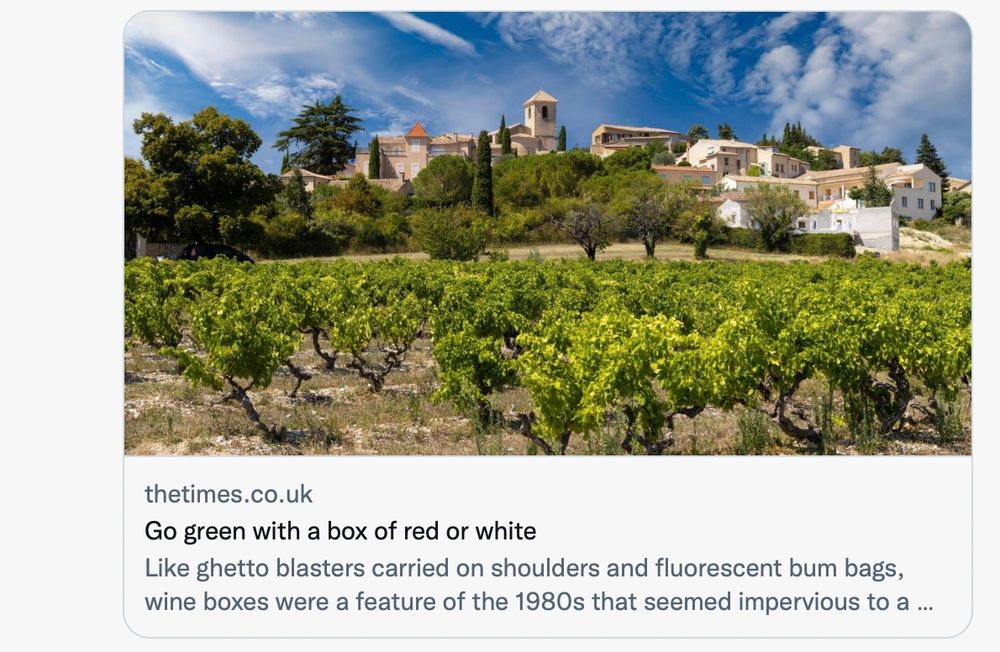
The Times published a news story on the back of the open letter from the WTAF to the government also published in the newspaper
It’s an open letter to the government. At its heart it has been a way of gathering support for our key messages: that the manufacturing and recycling of glass is wine’s biggest sustainability issue; that if we want to reduce the greenhouse gas emissions of the wines we drink, we need to be looking for wines in alternative formats wherever possible; and also that there’s no sacrifice in quality in doing so for wines drunk within a few months of purchase.
There’s another major message in there though. The IPCC (Intergovernmental Panel on Climate Change) has been pretty clear that it’s very likely that we need to reduce emissions by at least 43% across all sectors before 2030 in order to have any chance at not permanently exceeding a 1.5 degree rise in global temperatures.
There’s a lot of work being done by producers to reduce emissions in their viticulture, but without moving away from glass bottles this won’t be possible in wine. So we’re also calling for the government to help incentivise consumers to make the switch through the implementation of a consumer facing tax incentive.
This would be a very cost effective way of sponsoring significant reductions in greenhouse gas emissions, as well potentially being an excellent lever for the growth of a sustainability focused sector.
Any key signees?
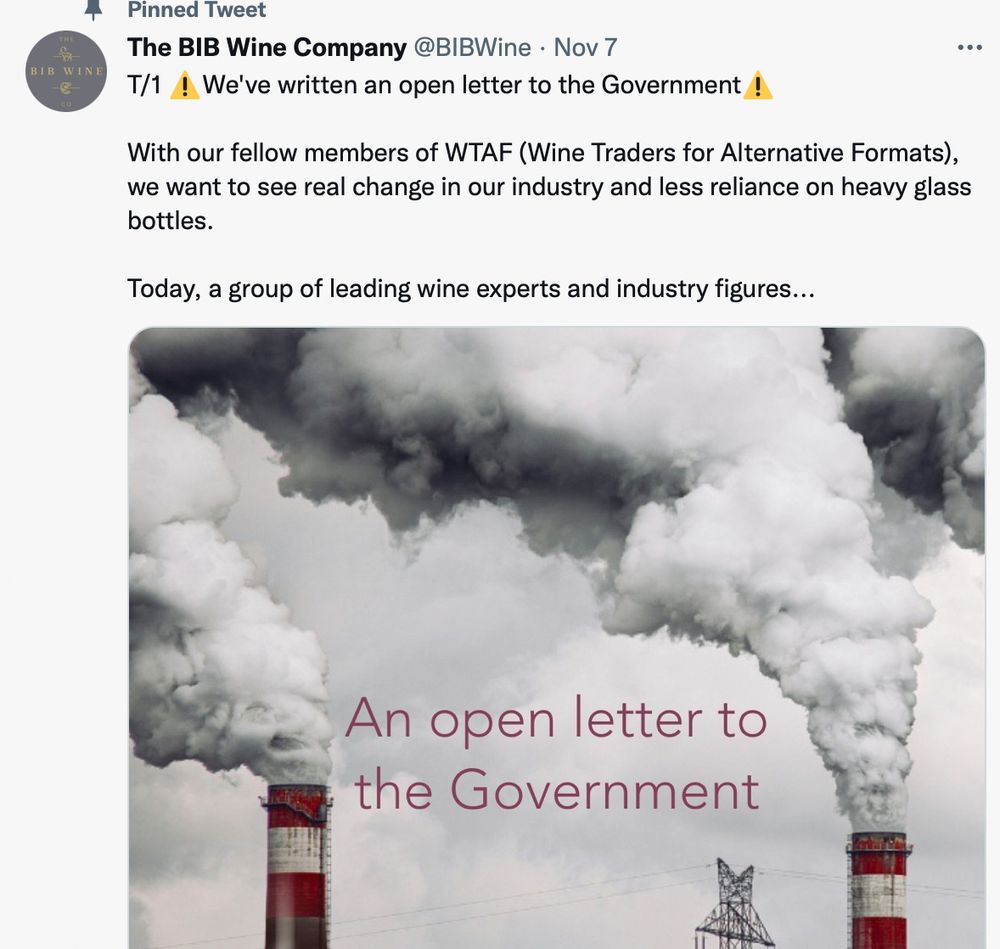
BIB Wine Company promotes the open letter publication
The whole list is amazing to be honest. Thanks also to yourself and The Buyer for your support. We didn’t think we’d get anywhere near the number and quality of signatures that we have. But we shouldn’t have underestimated how much people in wine care about their industry becoming as sustainable as possible. It’s a list of the foremost wine experts in the UK, including the majority of national newspaper wine writers and some incredible sustainability experts who work in wine.
The whole thing definitely gained momentum when Jancis Robinson OBE MW and Hugh Johnson OBE signed the letter though. It’s been a brilliant process from start to finish – the content of the letter represents hours of discussions and emails with those that have signed it – WTAF has acted as a middle man as much as anything else.
Ordinarily, where industries have sustainability issues such as this, most efforts go into hiding them, or fighting the facts and figures. I think that this group of signatories has achieved something quite rare. It’s not often that an industry comes forward with its own problem and presents a solution to the government like this of its own volition – it’s an opportunity that should be grabbed with both hands by the government.
Can people still sign up?
The letter has been sent and published. But watch this space, as there may be follow up campaigns and petitions.
You have built your own business, BIB Wine Company, around bag in box – why did you see that as the right format?
All the formats represented by WTAF come with savings to GHG emissions and other benefits and I don’t believe that there is a ‘right’ format. However, they are brilliant to live with. They last weeks once opened, and we love being able to pour a single glass without worrying about finishing the bottle. Great by yourself on a week night, but also brilliant to share with friends. The wine also ends up being better value, as the dry goods costs and transport costs are lower.
However, it’s most important to find the format that works best for you and this doesn’t have to be boxed wine. This could be to do with size, ease of transport, or anything, but for any given wine drinker or situation, there’ll be an alternative format that works best.
What other steps are you taking – and like to see the bag in box category do more?
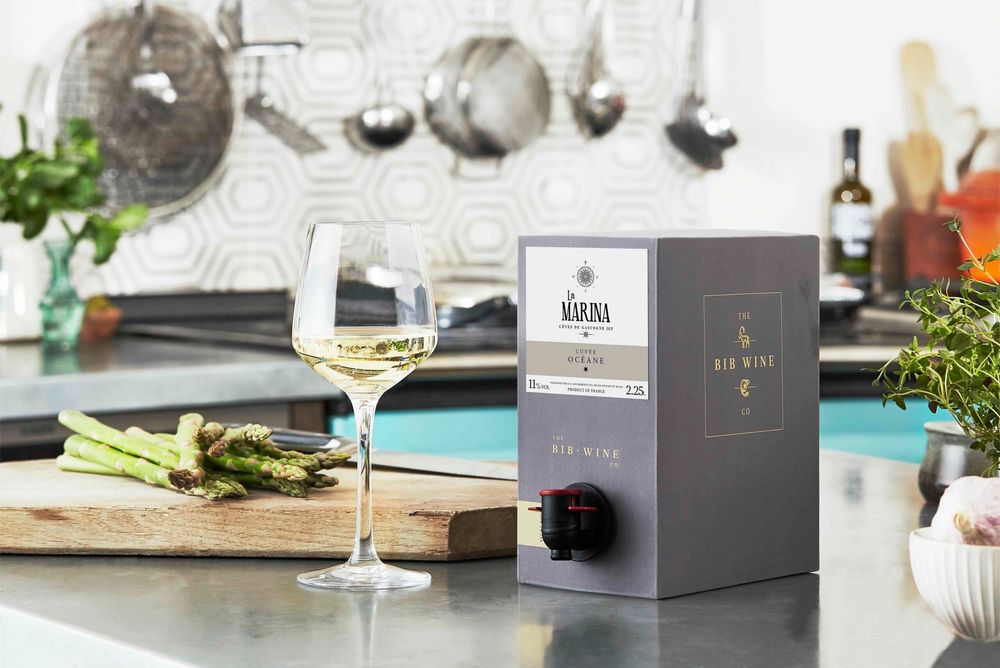
BIB Wine Company is looking to change the image of bag in box wine by sourcing premium wines from classic and emerging wine regions
The bags and taps have got so much better. You can put wines of any quality into boxes without any concern if done properly. But I’d love to see a bag developed specifically for ageing wine. This is technically possible, but the materials used would cost more and the testing period would be quite long! So sadly it might not come until the market is bigger.
Otherwise, the biggest thing that can be done in boxed wine, and other alternative format wines, is to improve the infrastructure. We need filling lines that can cater for smaller runs and services from logistics partners to deal with small run production and the movement of smaller volumes of wine. Wine drinkers need variety – the more startups the industry can cater for the faster it will grow.
What other alternative formats do you think have real potential?
I love the formats that limit waste. It’s estimated that we pour over a third of the wine purchased in the UK down the drain due to unfinished bottles.
Where do you hope we can be in five and 10 years time with alternative formats?
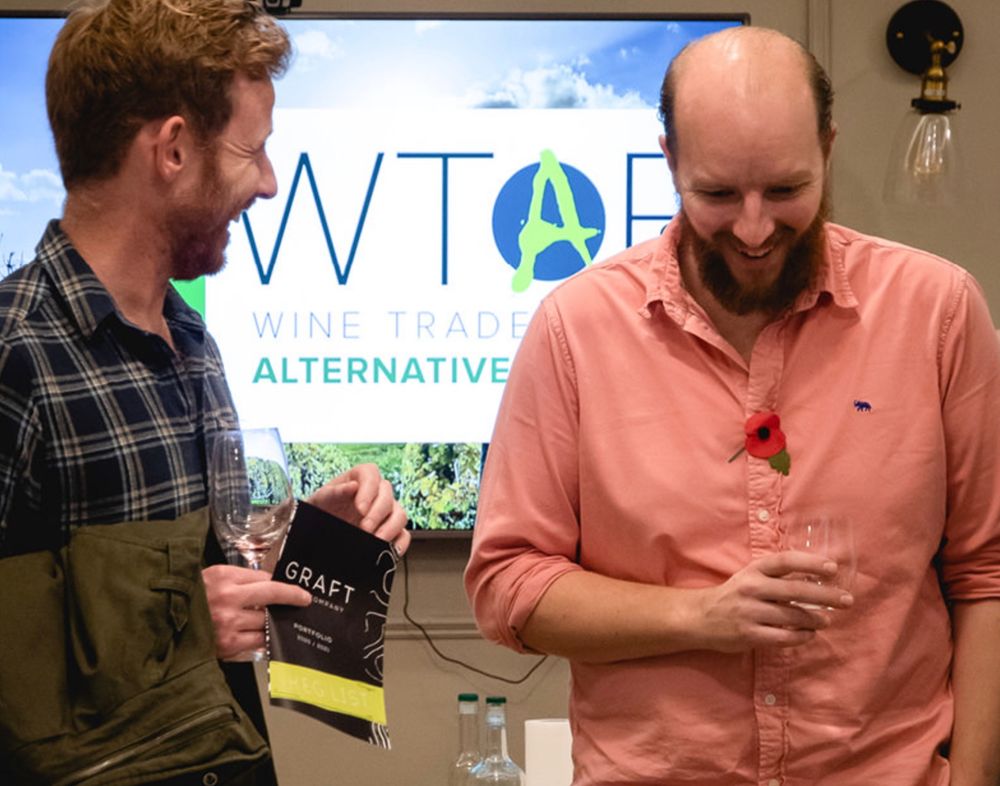
Oliver Lea at last year’s WTAF trade tasting
Much, much further. If we’re not, the wine industry should be held up for not doing its part to help tackle climate change. But our initiatives must be centred towards educating consumers, as it doesn’t matter how we package the wine if consumers aren’t armed with the facts.
What are the next steps?
We want to continue to get the message out there, so more of the same. We need to keep making the case for alternative wines, and push the wine industry to do more to adopt them, and more to promote them. We have to keep the discussions going in the industry. There are some bigger companies, supermarkets for instance, who could be doing much more with their product placement and procurement – we should be talking about setting targets. Most Nordic countries have achieved over 50% market share in formats other than glass, shouldn’t supermarkets be committing to doing the same?
We want to work with the government on how an incentive such as a VAT cut on alternative packaged wines could help build a more sustainable wine market in the UK. Public policy (through packaging taxes and volume pricing structures) in Nordic countries has favoured alternative formats, and resulted in much higher market shares than anywhere else in the world.
This has come through considered state support for sustainability in wine. We should be doing the same in wine in the UK, and in fact, in all sectors.
- You can find out more about WTAF and what it is trying to do at its website here.
An open letter to the Exchequer Secretary to the Treasury, James Cartlidge MP
The manufacturing and recycling of glass bottles is wine’s biggest greenhouse gas contributor. In order to minimise the carbon footprint of the wines we drink, we need to seek out wines in alternative packaging wherever possible.
Switching from glass to alternative formats could save as much as 750,000,000 KgCO2e of emissions every year in the UK alone. This is the equivalent of taking 350,000 cars off the road overnight, and equates to well over a third of the carbon footprint of wine consumed in the UK.
The IPCC’s (International Panel on Climate Change) recently found that without deep and meaningful emissions reductions across all sectors, it will not be possible to limit global warming to 1.5°C. In the scenarios they assessed, greenhouse gas emissions must be reduced by 43% this decade.
We believe that like all other sectors, wine is duty bound to achieve this target as an absolute minimum. This will not be possible without reducing our reliance on traditional glass bottles. Viable alternative formats include boxed wine, canned wine, kegs, returnable glass bottles, paper bottles and pouches, all of which come with vastly reduced carbon footprints as well as a variety of other benefits. Crucially, there is little or no perceivable difference in quality between these formats and wine in glass bottles for wines drunk within a few months of purchase, as most are.
Wine Traders for Alternative Formats (WTAF) is an alliance of premium and innovative wine companies promoting quality wine in alternative formats. We support the WTAF mission to reduce our reliance on single-use glass bottles and back their call for the introduction of consumer tax incentives for carbon-friendly alternative packaging.
Signatories:
- Oliver Lea – Managing Director, The BIB Wine Company
- Jancis Robinson OBE MW
- Hugh Johnson OBE
- Aidy Smith – TV Presenter, Drinks Columnist for the Evening Standard
- Aleesha Hansel – Wine Writer, Judge and Presenter/Broadcaster
- Andrew Catchpole – Editor, Harpers Wine and Spirit
- Ceri Parke – Owner, Cantina Goccia
- Dom de Ville – Director of Sustainability and Social Impact, The Wine Society
- Dr Jacopo Mazzeo – Wine Journalist, Photographer and Consultant
- Emma and Andrew Nielsen – Co-Owners, Le Grappin
- Helen McGinn – Author, Wine Writer, Presenter and Co-Chair International Wine Challenge
- Helena Nicklin – Wine Writer, Broadcaster, Judge & Author
- Jack Green – Co-Founder, Vinca Wine
- Jane MacQuitty MBE – The Times Wine Critic
- Jane Masters MW
- Jo Gilbert – Deputy Editor, Harpers Wine and Spirit
- Joanna Simon – Editor, Waitrose & Partners Drinks Magazine
- Kirsty Tinkler – Director Weino BIB
- Marieke Hammes – Sustainability and Operations Manager, Canned Wine
- Marta Juega PhD – Winemaker and Sustainability Manager, Alliance Wine
- Muriel Chatel – Managing Director, Sustainable Wine Solutions
- Neil Walker – CEO, The English Vine
- Nick Beck – Chief Commercial Officer, Kiss of Wine
- Nik Darlington – Marketing Director, Graft Wine Company
- Oli Purnell – Co-Founder, Copper Crew
- Peter Richards MW – Writer and Broadcaster
- Rich Hamblin – Founder and Owner, More Wine
- Richard Bampfield MW
- Richard Siddle – Editor, The Buyer
- Rob Buckhaven – Wine Columnist for the Metro
- Rob Malin – Founder & CEO, When in Rome Wine
- Rose Murray Brown MW – Consultant and Wine Writer for The Scotsman
- Rupert Joy – Wine and Sustainability Writer, Decanter Magazine
- Simon Rollings – Managing Director, Canned Wine Co.
- Susie Barrie MW – Writer and Broadcaster
- Susy Atkins – Wine Columnist, @telegraph.co.uk and Delicious Magazine
- Tamlyn Currin – Sustainability Editor and Wine Writer, JancisRobinson.com
- Tobias Webb – Co-founder and Director, The Sustainable Wine Roundtable
- Victoria Moore – Wine Editor for The Daily Telegraph
- Will Lyons – Wine Columnist for The Sunday Times
